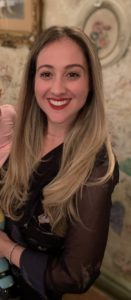Jun 9, 2020 By: ddefusco
 SLP Professor Michaela Medved says teletherapy can be a "wonderful" alternative, but it has its limitations.
SLP Professor Michaela Medved says teletherapy can be a "wonderful" alternative, but it has its limitations. SLP Professor Michaela Medved says teletherapy can be a "wonderful" alternative, but it has its limitations.
SLP Professor Michaela Medved says teletherapy can be a "wonderful" alternative, but it has its limitations.